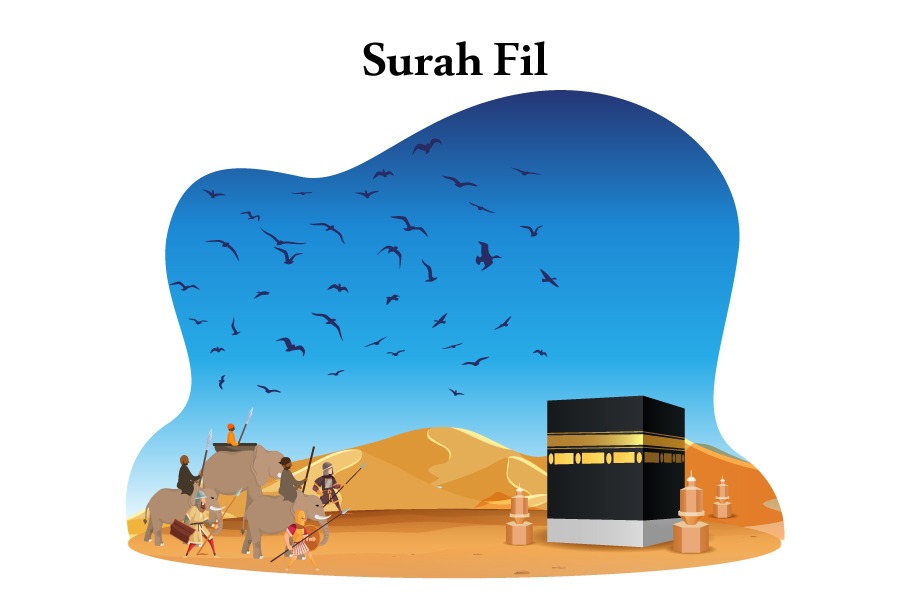Surah Al-Fil, where a fascinating story of an elephant and divine intervention unfolds! This captivating chapter holds a powerful narrative that has deeply influenced the Muslim community across generations. Together, we will discover the hidden treasures within Surah Fil and witness how its timeless teachings continue to ignite faith and resilience in believers today. Get ready for a journey through history and spirituality, where the past meets the present, and Surah Fil’s miraculous power becomes a beacon of hope in challenging times. Prepare to be inspired and uplifted by the profound impact of this chapter, as we unravel its mysteries and embrace the enduring strength of faith!
Surah Fil- The Chapter of the Elephant
Surah Fil, the 105th chapter of the Quran, unveils a captivating tale of historical significance and profound spiritual teachings. Often referred to as the “Chapter of the Elephant,” this short yet impactful Surah holds a special place in the hearts of Muslims worldwide. Its verses recount a pivotal event that took place in the ancient city of Mecca, where faith, divine intervention, and the consequences of arrogance intersected in a remarkable display of Allah’s power.
Surah Fil Translation
أَلَمْ تَرَ كَيْفَ فَعَلَ رَبُّكَ بِأَصْحَٰبِ ٱلْفِيلِ
Have you not considered, [O Muhammad], how your Lord dealt with the companions of the elephant?
أَلَمْ يَجْعَلْ كَيْدَهُمْ فِى تَضْلِيلٍ
Did He not make their plan into misguidance?
وَأَرْسَلَ عَلَيْهِمْ طَيْرًا أَبَابِيلَ
And He sent against them birds in flocks,
تَرْمِيهِم بِحِجَارَةٍ مِّن سِجِّيلٍ
Striking them with stones of hard clay,
فَجَعَلَهُمْ كَعَصْفٍ مَّأْكُولٍۭ
And He made them like eaten straw.
(AlQuran 105: 1-5)
Unique terms within Surah Fil
Birds Ababil
The birds sent by Allah to destroy the approaching army led by Abraha were known as “Ababil.” The term “Ababil” indicates that the birds came in groups or crowds. They might have arrived from different locations, coming in successive waves or divisions, similar to the way camels move within their herds.
It is described that these birds were small, green in color, and had heads resembling predatory animals. They were said to have emerged from the seaside and were guided by divine command to thwart Abraha’s army’s advance towards the Kaaba in Makkah.
Sijjil
Sijjil is described as stones that were firm and compact. Some scholars believe these stones were made of a combination of sand and clay.
`Asf Ma’kul
Asf Ma’kul refers to straw or the leaves of wheat. Some scholars suggest that it may also encompass the leaves of various plants and crops that are consumed by cattle and later expelled as dung.
Story of Surah Fil – How Allah Protects His Sacred Place
Many of us recite Surah Fil, even with its translation, but we may still wonder about its meaning and how birds managed to defeat elephants in the story. In the Surah Fil, Allah mentioned the event, known as the “Aṣḥāb al-Fīl” or “Companions of the Elephant,” took place in the year of the Elephant, around 570 CE, in the city of Mecca.
It is a story of an Abyssinian man named Abraha, who was a Christian and appointed as the governor of Yemen by the Abyssinian king. To assert his authority and strengthen the status of his kingdom, Abraha decided to build a grand church named “al-Qalis” in Sana’a, Yemen. He planned for this church to become a rival to the Kaaba in Makkah, hoping it would attract more people and make Yemen a central place for pilgrimage instead.
However, despite its magnificence, the new church failed to gain the acceptance and attention that Abraha desired. They decided to march toward Makkah with a large army, including one elephant, to destroy the Kaaba and eradicate its prominence, hoping that it lead people to abandon Makkah in favor of his church.
As Abraha’s mighty army approached Makkah, the people of Arab told Abu Mutlib, the leader of the Arabs. And he replied, Let them Come. Abdul Muttalib ordered the Qureysh to withdraw from the city and go to the mountains along with their families for fear of a general massacre. Then, he went to the Ka’bah along with some chiefs of the Quraysh and taking hold of the iron ring of the door, prayed to Allah Almighty. Ibn Hisham, in his book ‘Life of the Prophet,’ has cited some verses from Abdul Muttalib:
“O God, a man protects his house, so protect Your House; Let not their cross and their craft tomorrow overcome Your craft. If You will to leave them and our Qiblah to themselves, You may do as You please. My Lord, I do not cherish any hope from anyone against them except You. O my Lord, protect Your House from them. The enemy of this House is Your enemy. Stop them from destroying Your settlement.”
The Arabian tribes knew that the Kaaba was a sacred place, and they believed God would protect it. They prayed for divine intervention, putting their faith in the Almighty.
As Abraha’s army approached Makkah, a miraculous intervention occurred, with God Himself stepping in to safeguard His sacred house. He sent a flock of birds, called Ababil, each carrying three stones in its claws and beak. These birds, guided by divine command, started to dive toward Abraha’s army and pelted them with stones.
The stones were small, but they were infused with divine power. As they struck the soldiers, the stones caused severe injuries, dissolving their flesh and causing their bodies to burst. Many of Abraha’s soldiers were killed instantly, while others were left severely wounded and unable to continue the attack.
The powerful and well-equipped army was no match for divine intervention. Abraha himself suffered excruciating pain from the injuries caused by the stones. He and his surviving troops were forced to retreat in humiliation and defeat.
Lessons in Surah Fil
-
God’s Protection:
The primary lesson from Surah Al-Fil is that God is the ultimate protector of His sacred places and those who seek refuge in Him. Despite Abraha’s massive army of elephants, God sent a swarm of birds carrying stones to destroy them before they could reach the Kaaba. It demonstrates that Allah’s house of worship, the Kaabah, will always be under his protection.
-
Stay away from Envy
Envy in Arabic is known as “hasad”. It is one of the most severe diseases of the heart, as described by the Prophet s.a.w. He warned us against envy as it weakens the soul and brings harm to the envier.
The Prophet s.a.w. said,
إِيَّاكُمْ وَالْحَسَدَ فَإِنَّ الْحَسَدَ يَأْكُلُ الْحَسَنَاتِ كَمَا تَأْكُلُ النَّارُ الْحَطَبَ. أَوْ قَالَ الْعُشْبَ
“Beware of envy because envy consumes (destroys) the virtues just as the fire consumes the firewood,” or he said “grass.”
(Sunan Abi Daud)
Abraha’s jealousy towards Makkah intensified and became uncontrollable. His envy of the Kaaba grew even stronger, leading him to plot its destruction, aiming to prevent people from visiting it. However, despite surviving the encounter, Abraha faced unbearable pain and eventually met his demise. This incident showcases Allah’s divine wrath against the tyrant Abraha.
-
The Importance of the Kaaba:
The Kaaba is a symbol of monotheism and the oneness of God (Tawhid) that was established by the Prophets Ibrahim and Isma’il. Its preservation and protection from destruction serve as a testament to the continuity of this message throughout history.
Surah Al-Fil emphasizes the significance of the Kaaba as a sacred and holy place of worship. It is considered the ” House of Allah” and a place of reverence and respect for Muslim Worldwide. It also illustrated His promise to Prophet Ibrahim a.s. to protect Makkah as it is the beloved land of Allah and His Prophets a.s.
While standing at a location in al-Hazwarah (a place in Makkah), Rasulullah s.a.w. said:
وَاللَّهِ إِنَّكِ لَخَيْرُ أَرْضِ اللَّهِ وَأَحَبُّ أَرْضِ اللَّهِ إِلَيَّ وَاللَّهِ لَوْلاَ أَنِّي أُخْرِجْتُ مِنْكِ مَا خَرَجْتُ
“By Allah, you are the best land of Allah and the dearest of the land of Allah to me. By Allah, had I not been expelled from you, I would never have left.”
(Sunan Ibn Majah)
-
Faith in God’s Plan:
The surah teaches us to have faith in God’s plan and that He will protect His believers. Even when situations may seem dire and overwhelming, true believers should put their trust in God’s wisdom and providence.
-
The Magnitude of Small Acts:
The surah highlights the significance of seemingly small and insignificant creatures, such as the birds carrying stones, who played a pivotal role in the destruction of the powerful army. It reminds us that even the smallest of actions can have significant impacts when guided by the will of God.
How Does Surah Fil Relate to Modern Life?
The story of divine protection for the Kaaba from the mighty elephant army serves as a powerful reminder of the unwavering support and guidance we can find in times of difficulty. In today’s fast-paced and unpredictable world, this message encourages us to place our trust in a higher power, fostering a sense of peace and resilience amidst uncertainties.
Just as the birds played a pivotal role in the destruction of the mighty army, our efforts, however modest, can collectively lead to significant positive change. This reminds us that each of us can contribute positively to the world, no matter our circumstances. It inspires us to be more thoughtful and conscientious in shaping the world around us.
Surah Fil’s Impact on the Muslim Community
Surah Fil has left a profound impact on the Muslim community, it has become a symbol of hope and resilience for Muslims worldwide.
Surah Fil reminds Muslims of the central importance of the Kaaba in their faith and connects Muslims to their rich history and the legacy of the Prophets Ibrahim and Isma’il, who played a central role in the construction of the Kaaba. It reinforces the continuity of faith and serves as a source of inspiration for Muslims to uphold the values of monotheism and devotion to Allah.
Protecting the Kaaba from Abraha’s army reinforces Muslims’ belief in Allah’s power and protection. This Surah serves as a powerful reminder that God is the ultimate source of strength and that placing trust in Him can provide comfort and reassurance in times of adversity.
It offers spiritual guidance by teaching Muslims to place their trust in Allah’s plan and to rely on His guidance in all aspects of life. It reinforces the importance of seeking refuge in God during times of distress and turning to Him in gratitude during times of joy.
The Profound Benefits of Surah Fil
Every word of the Quran carries a profound impact on Allah Almighty’s creation. Muslims firmly believe that the Quran is the divine revelation sent to Prophet Muhammad (SAW) and serves as a source of guidance, wisdom, and divine knowledge. It is considered the ultimate solution for all modern challenges. Reciting and memorizing Surah Fil, like other chapters of the Quran, brings countless virtues and benefits.
- It safeguards against harmful creatures and can aid in preventing health problems like high blood pressure and diabetes. This chapter offers security from adversaries and aids in resolving personal issues.
- Consistent recitation of Surah Fil can help one overcome enemies and the challenges they pose. It serves as a source of comfort for those facing worries and troubles, providing solace and reassurance.
- Moreover, if one fears confrontation with an unkind leader, reciting Surah Fil can help pacify their anger, ensuring protection from harm.
This surah holds great value in promoting well-being and serenity in various aspects of life.
Memorize and Recite Surah Fil with AlQuranClasses
Imagine being able to memorize Surah Fil and unlock its countless blessings, all while enjoying the convenience of learning from home with AlQuranClasses!
Join us today and embark on a beautiful journey of Quran Memorization, guided by our expert instructors who will make the process interactive, and rewarding. Take the first step towards enriching your spiritual journey and seize the opportunity to connect with the Quran in a meaningful way. Let’s make your Quran learning experience truly enjoyable and transformative!
Conclusions
Surah Fil is not merely a historical account; it is a timeless lesson of faith, humility, and the unwavering protection of Allah. As we embark on a journey to explore the depths of this chapter, we will uncover its beauty, unravel its moral teachings, and reflect on its implications in our modern lives. Surah Fil has left an indelible mark on the Muslim community, inspiring devotion, hope, and a profound understanding of Allah’s might and mercy.
Frequently Asked Questions
- Where and when was Surah Fil Revealed?
Surah Al-Fil was revealed to Prophet Muhammad (SAW) during the early stages of his prophethood while he was in Mecca, before the migration to Medina in the year 622 CE.
- How many verses are in Surah Al-Feel?
Surah Al-Fil, the 105th chapter of the Quran, is composed of 5 verses and is located in the Last Para (Juz’) of the Quran.
- How often do Muslims recite Surah Fil?
Muslims have the option to recite Surah Al-Fil during their regular prayers or in times of distress when seeking Allah’s protection.
- What is the historical significance of the Year of the Elephant?
The Year of the Elephant is significant for Muslims as it marks the year when Allah protected the Kaaba from destruction.

















